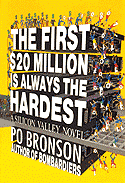 There’s a marvelous game embedded in Po Bronson‘s excellent 1997 book The First $20 Million Is Always the Hardest: A Silicon Valley Novel. The game’s free and you can play it almost anywhere. It’s called “Ten Women.”
There’s a marvelous game embedded in Po Bronson‘s excellent 1997 book The First $20 Million Is Always the Hardest: A Silicon Valley Novel. The game’s free and you can play it almost anywhere. It’s called “Ten Women.”
The first time you hear the rules, the game sounds like a sexist piece of politically incorrect frat-boy mischief — and, okay, there is an element of that. But once you’ve played a handful of times, you realize that this game isn’t really about sex at all; it’s a potent way to examine how we make choices and deal with opportunities.
Here are the basic rules for “Ten Women”. (Or, at least, here’s how I remember and play the game.)
- Sit or stand in a public place where there’s plenty of pedestrian traffic. Mall, airport, movie theater, baseball stadium, it doesn’t matter.
- Take a careful look at the next ten women who walk by, one at a time.
- As each woman passes, you must decide right then and there whether that’s the one woman out of the ten you get to go to bed with.
- Once that woman has passed you by, you can no longer choose her. You’ve lost the opportunity forever.
- If you pass on the ninth woman, then you’re stuck with the tenth, no matter how unattractive she might be (by whatever standards you use to judge that).
Sounds juvenile, right? Sounds sexist? Indulge me here. Keep reading.
“Ten Women” is about women in the same way that blackjack is about laminated pieces of paper with pictures and numbers on them. It’s really about taking risks and making gambles. It’s about learning to make quick decisions and not regretting your mistakes. The people — like the cards — are just tokens.
Still think the game is sexist or objectifying? Then think about this: imagine these ten women are ten stocks you might buy. Or ten colleges you might enroll in. Or ten potential employees you might hire. Ten properties you might buy. Ten potential spouses. (Did you make the right choice marrying your teenage sweetheart, or should you have waited to see if someone more compatible came along…?)
Make your choice, and make it now. Remember, you can’t change your mind. Time marches on, opportunities disappear. You can’t unchoose.
The blackjack comparison is actually quite apropos. In both games, you’re making a split-second decision based on the scantest evidence. For blackjack, you’re guessing whether the next card will get you close to a score of 21 without going over, based on the known cards in the deck. For “Ten Women,” you’re guessing whether the next woman will be attractive, based on the general composition of the crowd and the type of place you’re parked at. The next person who walks by might be the most desirable woman in the history of the world; she might be, well, that woman’s polar opposite.
(The big difference between blackjack and “Ten Women,” of course, is that with the latter there is no definitive valuation system. In blackjack, a seven of spades is a seven of spades, period. But how do you judge whether a person is attractive or not? Can you necessarily make the leap between attractiveness and sexual compatibility? What part does personality play in the equation? And so on.)
The great thing about “Ten Women” is that you can very easily tweak it to apply to any gender, sexual preference, ethnicity, or demographic. You can define your own parameters of victory. Remix the rules and call it “Ten Men,” or “Ten African-American Women,” or “Ten Gender-Neutral Height-Challenged Persons of Asian Descent” if you’d like. Or take out the prurient aspects altogether and aim for the tallest or shortest person out of ten.
You’ll be amazed at what half an hour of this game will reveal about your personality and your character. What criteria do you use to make spur-of-the-moment decisions? How quickly can you make choices? Are you a gambler that passes over the mediocre Women #1-7 in the hopes of landing your perfect mate in Woman #8, #9, or #10? Are you a conservative soul who sticks with the nice-but-unremarkable Woman #3? Do you choke up with indecision and wind up with Woman #9 or #10 every time?
Play the game with a friend, and you’ll be amazed at what the game reveals about the inequities of society. Sometimes you start playing “Ten Women” right when a bus full of [insert your least sexually desirable demographic here] starts unloading passengers. You’ve got a losing hand, the cards are stacked against you, and there’s nothing you can do but minimize your losses. Meanwhile, your friend starts counting right when a group of [insert your most sexually desirable demographic here] walks by, and he’s got the pick of the litter. Life is unfair.
In The First $20 Million Is Always the Hardest, Bronson uses the game to discuss the pitfalls of the software industry.
It was like shipping software [he writes]; if you chose not to ship, you couldn’t ever get the opportunity back … The relevant question never goes away: Do I ship now, entering the market before my competitors, thereby gaining early market share? Or do I wait, improve my program until it’s the best on the market, and steal market share with a superior product?
There are all kinds of ways you can apply the game of “Ten Women” to your life. The metaphors you use are up to you.